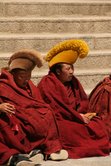While traveling in China in May 2007, my buddy Steve and I would check into Internet cafes on a more or less daily basis to update our blogs and email our wives. Internet cafes were plentiful across the country. It wasn't uncommon to have hundreds of computers in huge rooms with people of all ages working and playing. One game in particular seemed to be really popular: Counter-Strike. People played it in every cafe we went into, and finally, our curiosity got the best of us.
In Xian, after finishing up our daily updates, we asked one of the staff to hook us into a Counter-Strike game. He came over, fiddled with the keys for a while. We were in. And then, we were dead. The game reboots itself automatically. Since we had paid for an hour's worth of play, we kept going. And dying. Granted, we were amateurs, but we couldn't figure out anything at first, and with virtually no command of Chinese, it was difficult to ask for help. Eventually though, we figured out that by pressing different buttons, you could get more than just a knife (we had gotten better at sneaking up on people, stabbing them, stealing their guns), but by that time, our hour was up.

 Monks at Labrang
Monastery
Monks at Labrang
Monastery
A few days later, we were in Xiahe, home to the impressive Labrang Monastery. At nearly 10,000 feet, the air was clear and crisp. The dramatic scenery coupled with the monastery itself made for a moving and exotic experience. The town was full of local monks, ranging in age from young boys up to octogenarians. They wandered around the downtown area in their maroon robes.
As it turned out, our local guide was a bit of a Counter-Strike guru; he gave us some lessons during the couple of days we were in town. With some coaching, Steve and I finally got the hang of the game – or so we thought.
We were playing one evening against some opponents who were better than any others we'd encountered so far. Counter-Strike is an online game, hard to tell who we were playing or where they were. Eventually though, we discovered a pattern. Every time one of us would get killed, we'd hear laughter across the room. Behind us, on another set of computers, was a small group of local kids, who were enjoying kicking us around the virtual battlefield.
There were two "monklets", ten years old or so, watching our pathetic attempts against the kids across the room. Increasingly dissatisfied with our progress, they went from standing behind watching over our shoulders to muscling us out of our seats. Then the magic began. Far from the stereotype of the peace loving Buddhist monk, these little guys were fierce adversaries. Mercilessly, their fingers flew around the keyboard in a flurry of on-screen destruction and death. Simultaneously using the keystrokes, mouse movements and text messaging one another, they coordinated attacks all around the battlespace. Within just a few minutes, we were the last ones standing. It was ironically amazing. Steve and I, who have actually had military training, were thoroughly whipped by a couple of young kids – monks – sworn to peaceful pursuits such as memorizing sutrahs and meditating. Still, it was a lot of fun, even if we were no good at it.
Buddhism expounds the Four Noble Truths and the Eightfold Path as means to achieve Enlightenment. I'm not sure where Counter-Strike fits into that path, but if it is in there, then these monklets are well on their way.